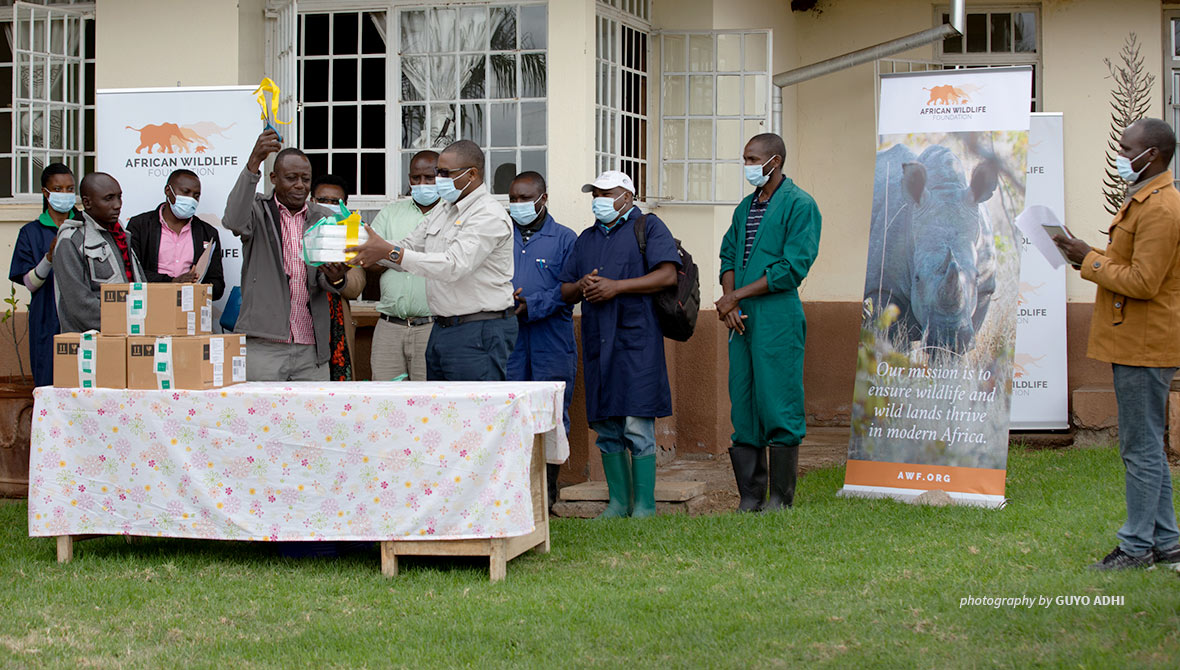AWF Facilitates Livestock Vaccinations at Manyara Ranch
General Inquiries
Tel:+254 711 063 000
Ngong Road, Karen, P.O. Box 310
00502 Nairobi, Kenya

Manyara Ranch has on June 8, 2021 received 30,000 vaccine doses to protect its livestock from Peste des Petits Ruminants (PPR), also known as sheep and goat plague. The vaccines were handed over to the African Wildlife Foundation (AWF) at the ranch offices by the Department of Livestock officials from the Monduli District Council for use on the ranch and for distribution to nearby communities.
The AWF-supported Manyara Ranch has been identified by the Tanzanian office of the Food and Agriculture Organisation of the United Nations (FAO) as one of its implementers in FAO’s Livestock Vaccination Campaign.
PPR is a highly contagious animal disease affecting domestic and wild small ruminants. It is caused by a virus belonging to the genus Morbillivirus, family Paramixoviridae. Once introduced, the virus can infect up to 90 percent of an animal herd, and the disease kills anywhere up to 70 percent of infected animals. The PPR virus does not infect humans.
“There is a high rate of interactions between livestock and wildlife on the ranch. Vaccinated goats and sheep in the community will reduce the spread of the disease and create safer conditions for both domesticated and wild ruminants,” said Pastor Magingi, AWF Program Manager in Tanzania.
Manyara Ranch is a mixed-use ranch, hosting key wildlife populations including lions and elephants, while also home to a thriving commercial livestock program currently boasting some 840 heads of cattle and 540 sheep.
The ranch supports the livestock herds of two neighboring communities, Oltukai and Esilalei, with pasture and water points during the dry season. In addition, they benefit from improved cattle breeds.
“For this vaccination exercise, it was important to go through Manyara Ranch in order to reduce any resistance from the community members. The good relationship between AWF and the community makes it much easier to collectively manage the health of the livestock here,” said Dr. Raphael Mwampashi, the acting officer in charge of the Zonal Veterinary Centre in Arusha.
The ranch is a wildlife corridor connecting Tarangire and Manyara National Parks and plays the vital role of enabling unfettered wildlife movement in the landscape.
AWF took over the day-to-day management of the ranch in 2013 and introduced anti-poaching and security operations which significantly reduced poaching incidents, as well as community outreach programs that reduced the frequency of livestock incursions into the ranch.
“We have benefited from this vaccination exercise and from AWF’s management of the ranch. Wildlife populations have recovered and the ranch is well-maintained and clean. We appreciate the livestock operations on the ranch which have helped to improve the communities’ livestock herds, thereby improving the health of the ecosystem at large,” said Manyara Ranch Advisory Committee Chairman Lelia Medoti.
About African Wildlife Foundation
The African Wildlife Foundation is the primary advocate for the protection of wildlife and wildlands as an essential part of a modern and prosperous Africa. Founded in 1961 to focus on Africa’s conservation needs, we articulate a uniquely African vision, bridge science, and public policy, and demonstrate the benefits of conservation to ensure the survival of the continent’s wildlife and wildlands.
MEDIA CONTACT: For more information about the AWF’s work at Manyara Ranch contact Jacqueline Kubania at [email protected]